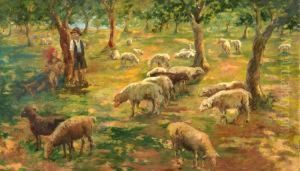Ulisse Pichi Paintings
Ulisse Pichi was an Italian artist known for his work in the field of engraving and printmaking. Born in 1879 in the city of Livorno, Italy, Pichi was part of the vibrant early 20th-century art scene that was heavily influenced by the movements of the time, including Art Nouveau and later, Modernism.
Pichi started his artistic career at a young age and was initially trained in the classical tradition. However, he soon developed an interest in the graphic arts, particularly engraving. He became a master of the etching process, a technique that involves using acid to cut into the unprotected parts of a metal surface to create a design in the metal. This skill would define much of his career and contribute to his reputation as an artist.
Throughout his life, Pichi produced a wide range of works, including landscapes, portraits, and urban scenes. His engravings often depicted his hometown of Livorno and the surrounding Tuscan countryside, capturing the beauty of the Italian landscape with a fine attention to detail and a deep appreciation for the interplay of light and shadow.
Pichi's work was well-received during his lifetime, and he participated in numerous exhibitions, both in Italy and abroad. He was a member of various artistic circles and associations, which allowed him to stay connected with the latest trends and to exchange ideas with his contemporaries.
Despite being less well-known internationally than some of his peers, Pichi's contribution to the art of engraving has been recognized by art historians and collectors. His prints are sought after for their technical excellence and the beauty of their composition, and his legacy continues to be appreciated by those with an interest in the traditional methods of printmaking.
Ulisse Pichi passed away in 1954, leaving behind a body of work that continues to inspire and attract admiration for its craftsmanship and artistry. His engravings remain a testament to the enduring appeal of the printmaking medium and its potential for expressive detail and nuanced expression.
